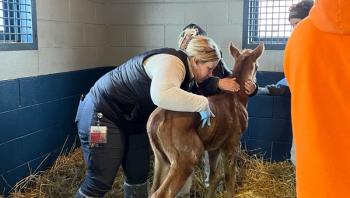
AVMA embarks on anti-AAVSB campaign
Schaumburg, Ill.- Days prior to the American Veter-inary Medical Asso-ciation (AVMA) annual convention in July, group leaders took on a mass mailing designed to derail rival education equivalency standards put forth by the American Association of Veterinary State Boards (AAVSB).
Schaumburg, Ill.- Days prior to the American Veter-inary MedicalAsso-ciation (AVMA) annual convention in July, group leaders took on a mass mailing designed to derail rival education equivalency standards putforth by the American Association of Veterinary State Boards (AAVSB). Estimatesfor postage alone for the outsourced project are more than $70,000.
AVMA is ratcheting up the fear factor, using words such as "direconsequences" to depict veterinary medical standards, should statesadopt the AAVSB program testing foreign graduates sitting for U.S. licensure.
At the same time, AVMA touts its own Educational Commission for ForeignVeterinary Graduates (ECFVG), the only nationally accepted means of assessingeducational equivalence since its 1959 inception and challenged by the AAVSB'sProgram for the Assessment of Veterinary Education Equivalence (PAVE).
"The danger is clear - loosening the standard of educational equivalenceset by the well-established ECFVG could quickly flood the United Stateswith unqualified 'veterinarians' and threaten animal and public health,"the literature reads.
Change of plans
This occurs despite AVMA Executive Vice President Dr. Bruce Little'srecent statements to DVM Newsmagazine that the AVMA/AAVSB rivalry wouldtake a backseat at the groups' 2002 conventions, which ran simultaneouslylast month in Nashville.
"We're not allowing that issue to overwhelm us like it did lastyear in Boston when it absolutely consumed us," Little told DVM Newsmagazinebefore the AVMA convention.
AAVSB Executive Director Charlotte Ronan, in spite of the mailing, alsopromised the dispute would not arise.
"There was misinformation in these letters AVMA sent out, whichto my knowledge, were customized according to individual states, each personallyaddressed to members of the veterinary boards," she says. "It'sall really quite remarkable.
"But we're not going to let this get us down."
Program presses on
But as AVMA leaders speak of peace, they're vehemently urging state veterinaryleaders to reject PAVE as more states adopt AAVSB's model practice act.
To date, five states recognize PAVE and three more are moving to acceptit (see Fact Box). Thirty-five students are scheduled to take the program'sfirst qualifying exam this month even as its clinical skills section sitsin development.
"The clinical skills exam will be complete by the time it's needed,and it in no way invalidates the rest of our program," Ronan says.
AAVSB views AVMA animosity as the group's fear of losing its grip ona system generating money and power.
Little says greed isn't an issue, and AVMA actually loses money on aprogram that costs $6,000 per student.
"AAVSB propaganda is not true," Little says. "We actuallyspend $150,000 a year managing this program. What we're doing is fightingto protect the credibility of the veterinary diploma."
ECFVG vs. PAVE
The enmity between AVMA and AAVSB leaders dates back to 1999, when PAVE,in its development, was publicized as the country's improved means of testinggraduates from non-accredited schools. Students criticized ECFVG for itsbig price tag and long waiting list. AAVSB deemed AVMA's involvement withthe system as a conflict of interest because the group controls much ofthe licensure and college accreditation processes.
All the while, AVMA officials pointed to holes in the AAVSB program,focusing on a PAVE factor that allows students to "circumvent the accreditationprocess" by taking a clinical skills assessment exam prior to graduationinstead of post graduation, as the ECFVG requires.
"It's all in the packet; everything there is the truth," Littlesays. "It's not what AAVSB wants to believe, but they cannot establisha benchmark to set the educational equivalency of foreign graduates withthe testing they propose. It's gotten out of hand. We felt compelled toget this material out."
Newsletter
From exam room tips to practice management insights, get trusted veterinary news delivered straight to your inbox—subscribe to dvm360.




